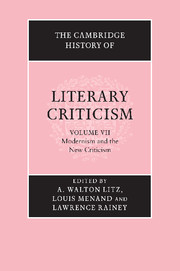11 - R. P. Blackmur
from THE NEW CRITICS
Published online by Cambridge University Press: 28 March 2008
Summary
And as you cry, Impossible,
A step is on the stairs.
Randall Jarrell, ‘Hope’‘Form is a way of thinking’, R. P. Blackmur wrote, and form was one of his cherished, recurring words. Yet he cannot plausibly be called a formalist, and it is entirely characteristic of his criticism that he should use an apparently smaller concept – technique – to get him into even larger territories. His approach, he said in 1935, in an essay called ‘A Critic's Job of Work’, was
primarily through the technique, in the widest sense of that word, of the examples handled; technique on the plane of words and even … linguistics … but also technique on the plane of intellectual and emotional patterns … and technique, too, in that there is a technique of securing and arranging and representing a fundamental view of life.
It may help to suggest that Blackmur's early work concentrated on technique in the first sense, with plenty of glances at the others, while his later work examined technique chiefly in the last sense; and that the middle sense never left him, early or late. This grouping corresponds very roughly to a focus on poetry and poets in the first books – e.g., The Double Agent (1935), The Expense of Greatness (1940) (much of this work reappearing in Language as Gesture (1952) and again in Form and Value in Modern Poetry (1957)) – and on prose and society in the later ones – e.g., The Lion and the Honeycomb(1955), Eleven Essays in the European Novel (1964), A Primer of Ignorance (1967).
- Type
- Chapter
- Information
- The Cambridge History of Literary Criticism , pp. 235 - 247Publisher: Cambridge University PressPrint publication year: 2000



